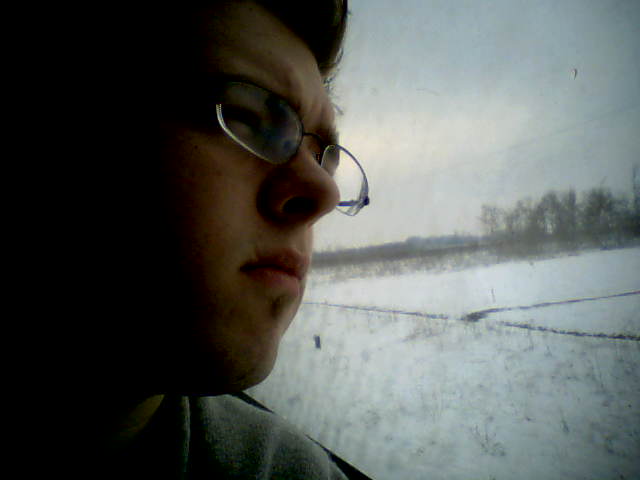velocity of our lives

In a recent article I read in Newsweek, Joshua Cooper Ramo the managing director of Kissinger Airlines had a quite remarkable point about our fast-paced and accelerated world. His statement was, “The great unpredictability of the last 20 years is both the most magnificent charm of modernity and its greatest terror.”
He introduces the term Personal Velocity. This half-adopted word from physics covers our average speed we take throughout our lives. According to Ramo’s theory, take the number of miles/kilometers you fly/drive/run (he talks about flying, though, I just make the idea develop further), then divide it by the numbers of hours in a year and finally you have produced your average personal velocity.
and began thinking: i travel a lot, from week to week, and in-between, how could i be less attached to objects, to certain daily rituals, to places?this happened: i was surfing the Web to get more info on mr. Cooper
and i found a blog that also dealt with this very article. the owner of the blog is Mr. Martin Varsavsky, the founder of Jazztel and Ya.com. He also teaches at Instituto de Empresa, Spain’s leading business school.
I decided to write an email to him, just to make sure i could link his article to mine. he wrote me back, saying, 'of course', so here is the link to Mr. Varsavsky blog and bio.
travelling broadens your mind- that's true, but does it have any side-effects? i am not so good at medical sciences, but i am undergoing a slight amnesia (including departure and arrival times) and serious insomnia. of course these effects do not include the notion of jet-lagging, which can make the situaton develop further in a malicious way.
to what extent do you think travelling can impact your life/our lives?


15 Comments:
Oh yeah, now I'm allowed to comment. thx, zso
So:
Interesting topic, on multiple levels - the one hand, it calls to mind the theories time and space compression (David Harvey), globalisation and glocalisation, de- and reterritorialization etc., along with the concepts of fixity and mobility in human/ cultural geography; on the other hand, the subjective understanding of time (e.g. Henri Bergson) and the subjective understanding of space (e.g. Yi-Fu Tuan or Gaston Bachelard).
This was just a quick note, I'll be getting back to this.
"ON the one hand," I mean
májmáj ... én aszittem a másik blogon nem tudsz kommentelni, bocsiiiii :-)
lávjú ám :-)
fine...which side of the topic would you like to be discussed further?
anyway, i was impressed by that comment, i need to study what these notions mean:)
thank you again ,Mymy!!!:)
I had no time to read this one ...yet but i will ...hope
so i've reaD the thing and i think that your amnesia is due to the fact that you have done your travellings about a million times now and you got used to it too much, i mean whatever happens during your travellings, it'll get thrown out cuz your brain wont take it as a serious matter/a rememberable fact..in one word those informations seem useless what happens the same time as your travelling....this is only a special case of the 'travelling-thing' cuz on the other hand if you do it not-regularly, but quite often, it can it can give you a lot of experiance not to mention fun and ..dont know what cuz i forgot:)
So i haven't read any scientific stuff about this but i will in time..an' i might get beack to this topic to discuss the other side of it.
bless this mess ...i mean the end of my latest
traveling. personaly I love traveling.
first thing that came to my mind was, have alook at the middle-ages, I mean the renessaince for example. in those days culture, knowledge and experience was aquired by traveling. there was a route that youngsters had to go through before becoming adults. Paris, Florence, Rome and so on. also during their trips, they met people, exchanged views. This benefit of traveling, I think is still valid. Of course in case you are open-minded, But I am, so...
Zuppy - yes; on the one hand, travelling itself broadens your mind, multiples your perspectives, whatever (I know this is cliché, but true nevertheless); on the other hand, you need to be open to benefit from the load of experiences - in opposition to being exposed to all those effects and impressions and letting them bounce off you at the same time. If you look for inspiration, if you are ready to take up all like a sponge - all that you find inspirational and likely to be benefitial to YOUR personality, your aims, inclinations, affinites -, you will indeed gain a lot. Without that approach, it is just a waste of time and energy, a meaningless fashion, an idle, routine-like activity to fill your time.
As far as attachment to places goes - it is a basic human need; it forms a basis of our identitites, and this is true in a world where we travel a lot faster than we used to and to an ever-increasing number of places. We all still need a place we call home, even though this locus may change, sometimes change relatively frequently through a lifetime - we may move from country to country even; but we form deep attachment to these places and they do become an essential part of our peronalities, our relationships, our memories. I would propose that people who travel a lot may even become attached to the loci (erm ... is this the plural form of locus?) of travelling - the airport, the train and the railway station, whatever - the means and act of travelling itself - which, thus, may itself form part of our identities. In other words, the content changes as the world around us - the pace and spatial extent of our lives - changes; the NEED, nevertheless, is there.
Something into my mind, as I was reading this post, Mimi.
Traveling fast. Yes, that is the world we are living in. But I object to velocity. I mean, if I want to TRAVEL, and not get somewhere, I want to experience the time it takes to get there. You know: "Patience is the respect of time."
So when I travel I want to see all those things, that come across me. I like traveling by train best, because it's comfortable and takes some time. When I first went to Paris, I traveled 26 hours on train to get there. I saw people on stations, cows on the field, trees by the riverside. I got the feeling, that "I am not at home."
Second time, by plane, I didn't have that experience. I mean, takeoff, nothing to see, 2 hours, nothing to see, landing. "Am I home or am I abroad?"
SOmething like that, I feel that I can't get through to you with what I feel. Sorry.
No, I think I see what you mean.
And your post reminds me of Kundera's Lassúság. :)
thank you.
I've just read something that relates to this topic - Joni Mitchell says this in an interview (Valentine, Penny (1972) "The Seeker: Joni Mitchell" In: The Sound and the Fury. A Rock's Backpages Reader. UK: Bloomsbury Publishing Plc. 2003):
"I think there's a new thing to discover in the development of fulfilment. I don't think it necessarily means trading the search, which is more exciting than the actual fulfilment. I still have this dream that you can come to a place where there's a different kind of medium - a more subtle kind of exploration to do of one thing or one place or one person. Like, drifting through lives quickly and cities quickly, you know, you never really get to understand a person or a place very deeply. Like, you can be in a place until you feel completely familiar with it, or stay with a person until you may feel very bored. You feel you've explored it all. Then, all of a sudden, if you're there long enough, it'll just open up and flash you all over again. But so many people who are searching and travelling come to that point where it's stealing out on them and they just can't handle that and have to move on."
[url=http://dcxvssh.com]QotLLyODnoMr[/url] - sJRXboDdTykHpLM , http://yuxeflk.com
Post a Comment
<< Home